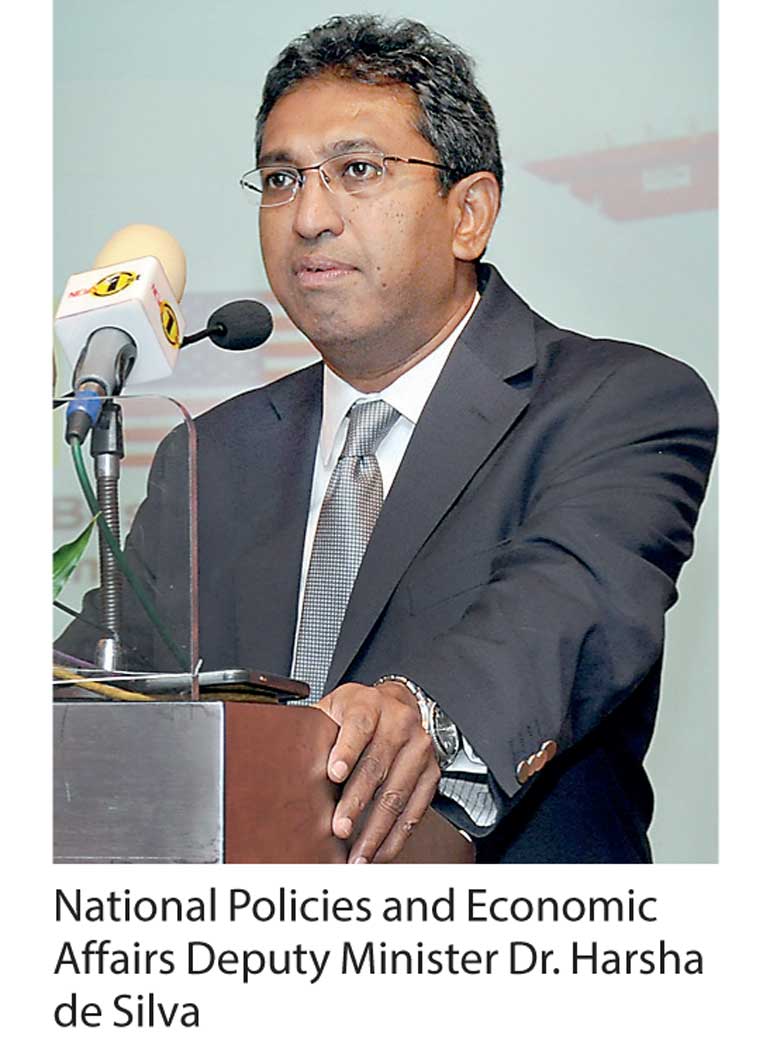Friday Feb 20, 2026
Friday Feb 20, 2026
Wednesday, 20 September 2017 00:10 - - {{hitsCtrl.values.hits}}

By Charumini de Silva
To take Sri Lanka to the next level with structural breaks along a different growth path, National Policies and Economic Affairs Deputy Minister Dr. Harsha De Silva yesterday insisted that trade reforms were absolutely essential to integrate the economy with the rest of the world.
Acknowledging that a dramatic decline in exports to GDP was the biggest issue, he highlighted the significance of creating an ecosystem that would help Sri Lanka to ride on GSP to improve exports to the US and generate competitive job opportunities with higher salaries.
“Sri Lanka has had GSP with the USA for a number of years now, and it gives us duty free access for certain types of exports to their market. But of over 500 HS codes, only 80 to 90 are being utilised, so there is an opportunity for exporters to exploit it,” he said while delivering the keynote address at a seminar on the US GSP program organised by the Sri Lanka-USA Business Council of the Ceylon Chamber of Commerce.
Noting that trade encompasses both imports and exports, he explained it was very difficult not to import anything and export everything. “People think export is good, import is bad. That is not the way one needs to look at trade. What makes sense is adding net exports to the GDP. You can do only export if you have gold or oil, but in our case we need to add value and export.”
It was pointed out that the high total protection rates in Sri Lanka were one of the key reasons to restrict imports into the country.
“According to the World Trade Organization (WTO), General Agreement on Tariffs and Trade (GATT) we have maintained certain tariffs but on top of those we have imposed all kinds of para-tariffs, which have resulted in total protection rates being very high. So you cannot talk about creating a hub in the Indian Ocean or an export economy if you don’t understand the fundamental economics that para-tariffs, other inhibiting levies and administrative controls are going to slow down the growth of your exports.”
He said total protection rates in most industrial HS codes during the period from 2005-2014 has increased from 10% to 20%, while also noting that it was even greater with agriculture. “Therefore we must be enlightened enough to be able to appreciate the fact that trade reforms are absolutely essential.”
Noting that Sri Lanka has been working for sometime on a Trade and Investment Framework Agreement (TIFA), the Minister said discussions were broadly on trade reform, diversification of exports and improving competitiveness.
However, he stressed that TIFA and GSP must all be looked at as one holistic way of improving trade between the US and Sri Lanka.
While commending the apparel sector’s contribution to exports during the past two decades, the Minister warned that going beyond there was very limited potential for the industry. “Unless we move to the next level of apparel, including hi-tech apparel, wearable apparel technology, designer apparel, the scope is limited.”
Pointing out that due to the tens of thousands of jobs that cannot be filled in the apparel sector in the zones because no one wants to take up low salary jobs, firms were now asking Government if they could be given some concessions to bring down people from Nepal, Bangladesh, Myanmar and various places. “How sustainable is that? Is that what we really want or do we really need to create jobs that pay good salaries? That’s the difficult question we as the policymakers have.”
Expressing optimism that trade between Sri Lanka and the US would grow further, Dr. De Silva said foreign investors would take advantage of the huge capital allowances that are being introduced by the Government.
“I hope the US will invest more in Sri Lanka. We are giving the opportunity for all.”
Justifying why the Government could not give tax holidays, he said its tax revenue to the GDP had fallen from 22% to 11% and there was not much the Government could do but increase tax revenues. In doing that, tax breaks become something that they have to look at seriously.
In terms of building a knowledge economy, he said that the IT sector has only been charged a tax of 14%, while also offering an additional 35% of employee cost which will be tax deductible.
“To create a knowledge economy you need machines and brains too. So we were able to give this amazing offer. It was not easy, but we managed to do it. Anyway if it is exports and ICT it is taxed at 14% and an additional 35% of your employee cost will be tax deductable. That is the kind of out-of-the-box thinking we have introduced,” he asserted.